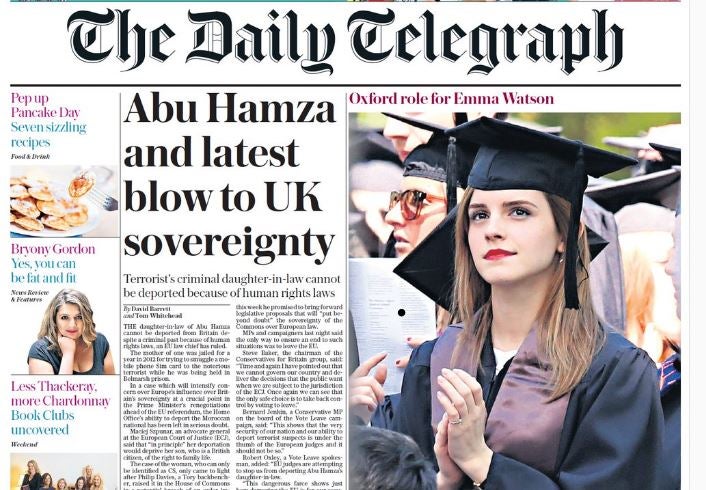
The Telegraph has committed its ninth breach of the Editors’ Code under press regulator IPSO with an inaccurate front page story.
Shoaib Khan complained about a piece headlined “Abu Hamza and the latest blow to UK sovereignty”, published in the Daily Telegraph on 6 February 2016.
It reported that an “EU law chief” had “ruled” that terrorist Abu Hamza’s daughter-in-law could not be deported from the UK.
The sub headline stated: “Terrorist’s criminal daughter in-law cannot be deported because of human rights laws”.
The article said that the woman had been jailed for a year in 2012 after “trying to smuggle a mobile phone Sim card” to Abu-Hamza while he was being held in Belmarsh prison. It said that an Advocate General at the Court of Justice of the European Union (CJEU) had said that her deportation would, “in principle”, deprive her son the right to family life.
The complainant said that the role of the Advocate General in the CJEU was to give a legal opinion for the court to consider. He said that this opinion was not a ruling of the court, and that the phrase “EU law chief”, and the reference to a “ruling”, were therefore misleading.
On 8 February, the newspaper made a number of amendments to the online article in response to this complaint. It replaced the word “ruled” in the sub headline with, “been advised”, and amended the first sentence to make clear that the Advocate General had said that CS could not be deported “solely because of her criminal past, an EU Advocate General has advised”.
It also offered to publish the following clarification:
An article of Feb 6 said that it had been ruled that a Moroccan mother with a criminal past could not be deported because of her British-born child’s right to family life under human rights laws. In fact, an opinion of an advocate general at the European Court of Justice (CJEU) was made under the EU Treaty on the Functioning of the European Union, not human rights laws. The opinion – subject to a final ruling by the CJEU would then be applied by a UK court – said that the deportation would breach her son’s right under the treaty to genuine enjoyment of the substance of his EU citizenship unless the UK could show that the mother’s conduct posed a serious threat to public security. We are happy to make this clear.
The complainant agreed the wording of the correction, but asked that it be printed on the front page.
IPSO noted that at the time of publication the CJEU had not made a ruling, but one of its Advocate Generals had provided an opinion.
It said the piece “significantly misrepresented the status of the Advocate General’s opinion by suggesting that the CJEU had ‘ruled’ on this case”.
IPSO said that the mistake was not sufficiently serious to warrant a front-page correction. It said the paper’s offer to publish the correction on page two was sufficient and this should now happen.
Telegraph Media Group has committed more breaches of the Editors’ Code than any other publisher since IPSO was launched in September 2014.
Email pged@pressgazette.co.uk to point out mistakes, provide story tips or send in a letter for publication on our "Letters Page" blog
